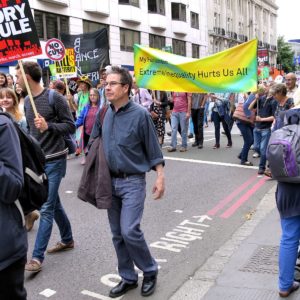Julie MacLeavy is a Reader at the School of Geographical Sciences, University of Bristol. Her research interests lie in the field of economic geography, particularly in debates around welfare reform, labour markets and neoliberal policy reform in contexts of austerity. Recent work has looked at the geographies of inequality and disadvantage in the UK.
Historical trends towards increased inequality are widening the gap between rich and poor. Julie MacLeavy argues that underlying the increasing distance between the rich and poor are a complex set of societal transmissions that reinforce and reproduce inequality over time. Here she breaks down how routinised and multi-layered forms of advantage and disadvantage are compounding processes of political and economic restructuring and leading to substantial fracturing within the middle of the income distribution.
In the UK, the impact of eight years of austerity is notable for a number of clear outcomes. Prime among these is the visible and clear increase in economic insecurity. With local councils being required to reduce spending and important services such as social care largely protected, the cuts are increasingly falling onto those services that councils are not legally obligated to provide. Often these include those services most likely to be used by families and especially children from disadvantaged backgrounds – the wealthier have already either bypassed or privatised their use in many cases. Examples of these services may include library facilities (157 libraries have been closed or removed from council control since 2010), parks and public green spaces (some 214 are thought to have close with further parks under threat) and youth clubs (350 closed between 2012 and 2014, with a further 41,000 places for youth service and 35,000 hours of outreach work cut), the closure of which reduces the state’s social provision. Although just three examples, all have been shown to be instrumental in early years and teenage development and the removal of which will further widen the inequality gaps between those who can afford to provide facilities privately and those reliant on local provision.
When viewed from an intergenerational standpoint, where inequalities are reinforced and reproduced over time for individuals, families and social groups, the negative outcomes of austerity appear even greater. Not only have the current and previous Conservative administration policies of local and national spending cuts led to groups and areas being left behind and hollowed out socially, they have caused stresses that will endure, perhaps for generations. The effect of rising inequality is a reduction of equality of opportunity and social mobility owing to the growing differences in the capacities of rich and poor families to invest in their children. Those occupying the so-called lower middle of the income distribution are likely to fall further behind and become (at least financially) closest to those who have already been marginalised and pushed into precarious positions by austerity driven changes. For example, while employment is at an all-time high with a record 32.4 million in work, figures show that there are now 33,000 ‘working homeless’ owing to a combination of high private-sector rents, the ongoing freeze in housing benefit, unstable tenancies and the shortage of social housing. This precarity does not only cause immediate pressures within the family where greater time resources must be devoted to securing housing compared to owner-occupier families but gives rise to future disadvantage as those without the stability of residence that ownership has traditionally provided cannot easily access other known ‘gateways’ to social mobility (such as being able to ‘buy into’ a desirable neighbourhood which can in turn facilitate access to better schooling, better transport links and/or positive community networks).

Image licenced under CC BY-SA 2.0
In a recent intervention in Regional Studies, David Manley and I suggested there ought to be an explicit research focus on these ‘intergenerational inheritances’ and the way they are inscribed in and through space. Alongside the diverging fortunes of those in the middle of the income distribution is a growing difference in the prosperity of whole communities, cities and regions. We need to examine the multiple ways in which people pass on privilege to their children and how individual life courses are shaped by directed inheritances and the indirect advantages conferred by the place(s) in which people are raised and/or educated. In a context where the gap between rich and poor is energising right-wing populism, it is vital that attention is paid to the multiple structures, both scalar and physical, economic and social, as well as those that are more ephemeral. In other words, we need to explore in greater detail the impact of, for instance, growing up in a secure family environment, with parents investing time in education support and providing access to extra-curricular activities, as well as the converse impact of living in a deprived neighbourhood with employer stigmatisation, family money worries and experiencing frequent residential moves as a result of increasing instability in the private rental market. This approach needs to be look at how specific forms of advantage or disadvantage are mutually constitutive. It also needs to consider how routinized and multi-layered forms of advantage and disadvantage are mediated by matters of gender, sexuality and race. By engaging in research into the long run implications of the different life-courses experienced by the middle group, we might disentangle the enduring effects of austerity and demonstrate that a desire to lower government debt must be weighed against increased inequality, not only now but also in the future.
This piece draws on the author’s published work in Regional Studies.
Are you currently involved with regional research, policy, and development, and want to elaborate your ideas in a different medium? The Regional Studies Association is now accepting articles for their online blog. For more information, contact the Blog Editor at RSABlog@regionalstudies.org.